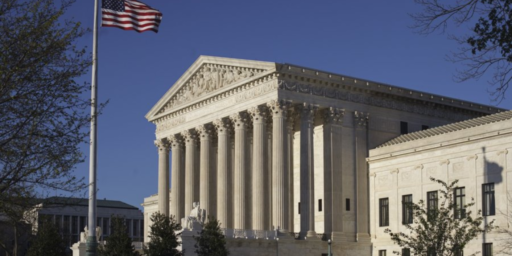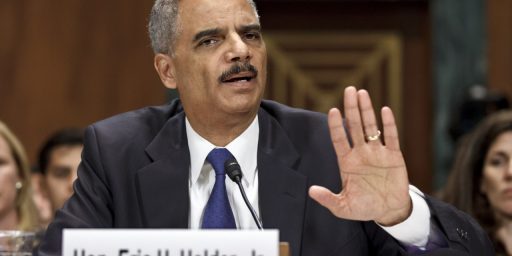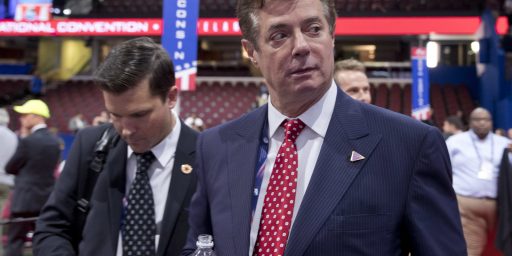Details and Thoughts on Holder’s Planned Changes to Drug Enforcement
Yesterday James Joyner wrote about Eric Holder’s announcement of planned changes to the way the Justice Department prosecutes drug cases. One thing the post didn’t delve into were the specifics of the change. As reported in The Guardian, Holder’s strategy is to “instruct [Federal] prosecutors to side-step federal sentencing rules by not recording the amount of drugs found on non-violent dealers not associated with larger gangs or cartels.”
Mandatory minimum sentencing guidelines, based on the amount of drugs carried versus the specific crime involved, were introduced during the 1980’s. Such sentencing guidelines remove all flexibility from the system and remove judges ability to give lesser sentences for low level crimes involving drugs. The net result of the guidelines, according to many scholars and analysts, is that federal prisons have been filled with low level criminals serving long sentences based not on the crimes they committed, but the amount of drugs on them at the time of their arrest.
Holder’s answer to this is to provide prosecutors with the discretion to, in certain cases, file charges without including the amount of drugs in question. Failing to provide that information means that upon conviction, the Judge will not be legally bound to the guidelines as they are triggered by the quantity of drugs rather than the crime that was committed.
In his post, James raised excellent points about how this can be seen as an end run around Congress. And to the degree that this order represents a step away from pursuing the maximium possible sentence in every case, he is correct, if we accept that Congress’s goal in passing the legislation was that any and every criminal caught with X amount of drugs was subject to the law.
That said, is that they only way to interpret the law?
As Ohio State University law professor Douglas Berman pointed out on this morning’s Morning Edition on NPR, Attorney Generals regularly announce these sort of general interpretive guidelines for federal prosecutors. Professor Berman notes that as recently as a decade ago, Attorney General John Ashcroft issued guidelines to federal prosecutors to always charge the most serious provable offense in drug cases.
If an Attorney General can remove proprietorial discretion through such an order (in the case of Ashcroft), it seems logical that they also have the power to return it (in the case of Holder). After all, even after the change that Holder is calling for take place, prosecutors will still charge plaintiffs with the same crimes they have been. The only change is that, in cases that qualify, the amount of drugs being carried at the time will not be included in the charge. Chances are, that there will be a significant amount of prosecutorial discretion in deciding which cases qualify.






Ashcroft put more blacks and hispanics in jail…so it was a good thing.
Holder wants to reverse that…so it’s a bad thing.
You can’t hope to win elections if you aren’t willing to put some minorities in jail.
I would rather see congress make changes in the law and how we treat and prosecute drug offenses.
Not a fan of mandatory minimums anyway-especially for cases that don’t in love violence.
@Just Me:
There is no question that the laws need to be changed. And, in fact, this has been happening on the state level for quite some time. The issue is that the federal government is lagging far behind and something needs to be done in the gap period.
That said, my point is that when one actually dives into what Holder did, in terms of the powers of his office, it’s not a radical as many have initially suggested.
What makes the decision radical is that its a rare case of an AG calling for more discretion in prosecutions. Generally speaking, the tendency is always for the tough to get tougher.
Even if Congress should change the mandatory minimums, there’s no reason for Holder not to direct prosecutors to use some common sense.
@David M:
Correct, especially since past AG’s asserted the power to direct prosecutors to maximum prosecution.
This is the country where a second grader gets suspended from school for nibbling his toast into a gun shape, and we’re talking of common sense?
Federal prosecutors already exercise discretion; they allow most drug cases to be prosecuted in the state system, and reserve their prosecutions for cases involving major drug trafficking. Holder has no authority over that. I don’t see anything in the policy that would do much, except perhaps in the margins, assuming a US attorney is of like mind on the underlying policy.
What the federal government could do is offer clemency to convicts who are actually suffering extreme sentences for minor altercations.
Some of this crime is being done by people stealing to support their drug habits. Many report that they move from drugs like these marijuana cigarettes on up the line to harder stuff. Some people now are mixing all kinds of junk with that marijuana to make it more powerful. It is just crazy and foreign to me and I wonder where it is all going to lead. The drug choice of our generation was beer and cigarettes. Chewing tobacco and other smokeless tobacco became wildly popular. (The Skoal Bandit, Cannonball chewing tobacco).
I think the government and churches should develop programs to get people off these drugs and have programs in schools such as the popular “Just Say No ” clubs and programs of years ago that kids just loved! Every kid had one of those shirts and buttons. I am afraid that all of this talk about decriminalization and possible legalization will give kids the message that these drugs are safe and ok. The president and attorney general need to come out publicly and tell the kids and everyone else to stay off drugs and stay healthy.
“I’m going to Jackson ….look out Jackson town” (Cash)
How old are U?
This film was made for U! REEFER MAAAAADNESSSS!
http://www.imdb.com/title/tt0028346/
@PD Shaw:
I see this as a finger in the air, judging the direction of the wind. If the pushback is intense, they slow it down. If there’s little pushback then they move the ball another few yards away from the madness of the war on drugs. It’s like Obama’s slow “evolution” on gay rights. Right direction, cautious movement.
@PD Shaw:
Really excellent point. And as I said before, States have been moving far quicker when it comes to eliminating or heavily revising these types of mandatory sentencing guidelines.
On the other hand, this type of policy chance does provide more coverage for many like-minded decision makers in various federal prosecutors offices.
@Matt Bernius: My point was rather that there are really few, if any, people this policy change would effect. Its highly unlikely that there is anybody being prosecuted on a drug matter in the federal courts solely for drug crimes, without a significant criminal record, or who does not have significant ties to drug trafficking.
No policy change IMHO.
Finally AG Holder and Obama admin working on making our justice system fair for all and about time too. Now, lets see them go after their friends on Wall Street and in the Banks who ran our country into the financial ditch, had to be bailed out by taxpayers and still have not been held accountable for their crimes. So far that is a legacy item for Obama. he has done nothing to hold his friends in banking and corporate America accountable for any of their crimes.
I’d rather have a unicorn that poops rainbow sherbet, but, alas, some things are impossible.
@michael reynolds: Is this what is going on now with the “Affordable Health Care” Act, his evolution and cautious movement.?
@Tyrell:
I’m not exactly sure what you’re referring to, but the answer is probably. The ACA was an incremental reform and is being implemented slowly and carefully. Several minor pieces have been delayed to make sure the insurance companies and employers have enough time to adjust to the changes, rather than forcing a deadline through that could be chaotic.
@Tyrell: I think the government and churches should develop programs to get people off these drugs and have programs in schools such as the popular “Just Say No ” clubs and programs of years ago that kids just loved! Every kid had one of those shirts and buttons. I am afraid that all of this talk about decriminalization and possible legalization will give kids the message that these drugs are safe and ok.
The Just Say No program was, in my opinion the absolute worst thing that was done to keep people from using drugs. A large part of this was due to largely classifying most common drugs as “drugs”. I was in elementary school when John Belushi died and the Just Say No program was sure to tell us that Marijuana was a schedule 1 drug (just like Cocaine and Heroin). Fast forward to high school and college and people find out about marijuana, why they just might not be so scared of cocaine and heroin anymore either. Have an honest converstaion with people about drugs and alcohol and nicotine. Don’t lie to the kids about them.
As for the rest of your post involving claims of “many” and “some say”. Those are weasel words.
@Tyrell
Where to start? “Just say no” was a bad joke. It’s a placebo offered up to parents and taxpayers so politicians and cops can say “something is being done” – ditto for Partnership for a drug free America. A lot of people have fairly cushy jobs in programs such as these, which is part of what the war on drugs is about, that is to say funding.
Illegal drug use has been reasonably stable for almost 50 years. The drugs of choice change, the chemists now are more skilled and more plentiful, but you should keep in mind drug use in this country peaked in 1979. There is no crisis here, its more or less business as usual.
The real preventable carnage is caused by the war on drugs. It’s kept prices artifically high, hence the crimes that take place to get drug money. It’s a big cause of the level of violence we see in inner cities and areas with drug smuggling activity.
8-10% of the population are natural born addicts. That is not going to change barring a medical breakthrough. We need to deal with this fact intelligently, not weave fantasies about how a lecture to fifth graders or a church program is going to make even a tiny bit of difference. The churches are already doing the right thing – giving twelve step programs places to meet.
You have been duped. You’ve been fooled into thinking feel good programs accomplish something, and you have fallen for a bait and switch designed to take the focus off of the carnage wrought by alcohol, tobacco, and prescription drugs. It’s worse than what the illegal stuff does by orders of magnitude. Take a look at how many people die every year as a result of smoking, and get back to me about how scary illegal drugs are.
Stop putting people in jail for pot. Legalize it, and tax it. Use the revenue to build clinics, and create economic opportunity in places where little to none exist now. Things will get better.
@anjin-san:
Even if Tyrell is right about the dangers of pot, the drug war and locking up users still isn’t the right response.
@ David M
Absolutely. And there is some danger associated with it’s use, especially to young people with still developing brains. I would balance legalization for adults with harsher penalties for furnishing to minors.
Beyond that, if your are going to get high, pot is possibly the least harmful way to do it. That does not make it harmless, but we need to get real about the fact that there are always going to be people that want to get high, and there is always going to be someone to sell them something to get high on. Society needs to gain more control over that process and mitigate the attendant damage, not make criminals out of a lot of people who would not otherwise be involved in crime.
@PD Shaw: Thank you. You basically answered my general question in James’ thread, which was: how much difference will this make?
I guess it has been long enough that most people have forgotten why mandatory minimum sentences were passed: the inability of judges to be sane and rational in their sentencing.
In a few years, there will probably be an academic study that white defendants were more likely to benefit from this policy and then there will be a call to change it again. Any time judgement and discretion is introduce to any part of the government, the disparate impact lawsuits follow.
Changing drug schedules based on evidence rather than early 70s hippie bashing would be a good start that wouldn’t require congress. The DEA and FDA could reclassify a variety of drugs. Marijuana for instance should be a schedule 3 or 4, not a schedule 1 drug. Looking at the list heroin and psychedelics make up schedule 1 and much more addictive drugs that wreak more havoc on a user’s body make up schedule 2. As bad as heroin may be, ice will do you in faster and uglier.
In fact, Heroin shouldn’t be Schedule I either. It does have legitimate medical uses, mainly fighting intense pain in people who are dying of cancer. Schedule II drugs like morphine are used for this now, but Heroin is much better. There are few if any other countries that have a ban on Heroin in the way that the US does, and for good reason. Cocaine is Schedule II (and rightly so); Heroin also belongs there.
@Grewgills: Heroin on it’s own isn’t actually that bad of a drug. It is extremely addictive but when used in a pure form it’s relatively safe. The problem is that street heroin is almost always cut so the user never really knows the strength of their score. That’s the leading cause of ODs without a doubt. Also there’s the issue of what is being used as cut. There’s some nasty stuff the criminal elements is putting in there.
Those are some of the reasons why I’m pro-legalization for most drugs such as heroin coke and such. That being said there are some drugs like Meth which are just straight dangerous regardless of the purity. Those should stay illegal. Most (if not all)meth heads would switch to a legal high if possible and thus do less damage to themselves and society in general.
@C. Clavin: Racism rears it’s ugly head again.
@Mu: Maybe he was going to use it to rape his teacher?
@CB: “I’d rather have a unicorn that poops rainbow sherbet, but, alas, some things are impossible.”
You have all the poop you need.